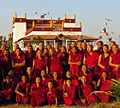Sangha facts for kids
In Buddhism, the word Sangha means "community" or "group." It's a very important idea for Buddhists. There are two main ways people use the word Sangha:
- The community of Buddhist monks and nuns.
- The community of disciples who follow the Buddha's teachings very well.
Buddhists show great respect to three things, often called the "Three Jewels." These are the Buddha (the teacher), the Dharma (the Buddha's teachings), and the Sangha (the community that follows these teachings).
Contents
What is the Sangha?
The Sangha is a key part of Buddhist life. It provides support and guidance for people who want to learn and practice Buddhism.
The Monastic Sangha
This refers to the community of Buddhist monks and nuns. They dedicate their lives to following the Buddha's path very closely. They often live in monasteries and follow special rules. Monks and nuns help keep the Buddha's teachings alive and share them with others. They are respected for their dedication and wisdom.
The Noble Disciples Sangha
This refers to a community of people, whether monks, nuns, or lay followers, who have deeply understood and practiced the Buddha's teachings. They have reached a high level of spiritual understanding. Ancient Buddhist texts often describe them as:
- "The Sangha of the Buddha's disciples who have practiced well... they are worthy of gifts, worthy of hospitality, worthy of offerings, worthy of respect. They are like a special field that brings good things to the world."
Why is the Sangha Important?
The Sangha is important because it helps Buddhists on their spiritual journey.
- It offers a place for people to learn and grow together.
- Monks and nuns provide guidance and teach the Dharma.
- The community supports each other through challenges.
- It helps preserve the Buddha's teachings for future generations.
Being part of a Sangha can give people a sense of belonging and shared purpose. It reminds them that they are not alone in their practice.
Images for kids
See also
 In Spanish: Sangha (budismo) para niños
In Spanish: Sangha (budismo) para niños





